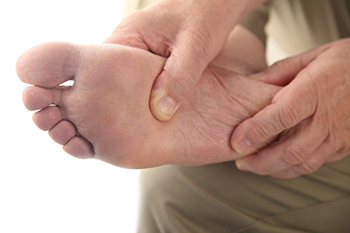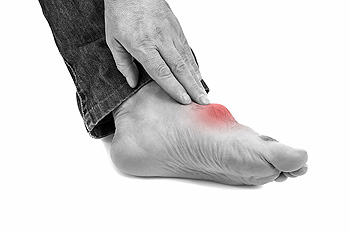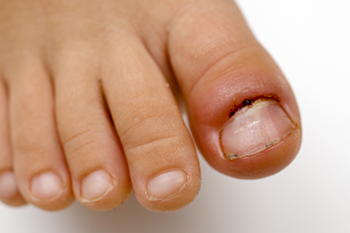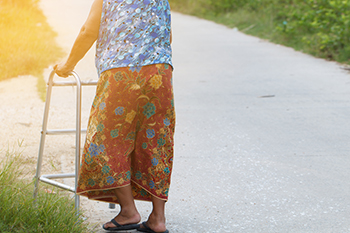Items filtered by date: July 2023
A Good Diabetic Foot Care Routine Is Essential

Practicing foot care is crucial for diabetic patients. The feet can easily become infected in people who have diabetes, and a good diabetic foot care routine can begin with washing and drying the feet daily. This can be followed by examining the soles of the feet. Some patients find it helps to use a mirror to accomplish this, or a family member or caregiver can do this if available. It is important to trim the toenails properly approximately once per week, and this can be done by cutting them straight across. Dry skin on the feet can be avoided when a good moisturizer is applied, and refraining from using it between the toes. Many diabetic patients have poor circulation and neuropathy, which is nerve damage. This is caused by elevated blood sugar levels, and the feet may become numb or have tingling sensations. It is often difficult to feel cuts or sores that have developed, which can be seen when the feet are inspected daily. If you have diabetes, it is strongly suggested that you are under the care of a podiatrist who can help you to manage this serious condition.
Diabetic foot care is important in preventing foot ailments such as ulcers. If you are suffering from diabetes or have any other concerns about your feet, contact one of our podiatrists from William Street Podiatry. Our doctors can provide the care you need to keep you pain-free and on your feet.
Diabetic Foot Care
Diabetes affects millions of people every year. The condition can damage blood vessels in many parts of the body, especially the feet. Because of this, taking care of your feet is essential if you have diabetes, and having a podiatrist help monitor your foot health is highly recommended.
The Importance of Caring for Your Feet
- Routinely inspect your feet for bruises or sores.
- Wear socks that fit your feet comfortably.
- Wear comfortable shoes that provide adequate support.
Patients with diabetes should have their doctor monitor their blood levels, as blood sugar levels play such a huge role in diabetic care. Monitoring these levels on a regular basis is highly advised.
It is always best to inform your healthcare professional of any concerns you may have regarding your feet, especially for diabetic patients. Early treatment and routine foot examinations are keys to maintaining proper health, especially because severe complications can arise if proper treatment is not applied.
If you have any questions please feel free to contact one of our offices located in William Street in New York, NY, Forest Hills, NY, and Broadway in New York, NY . We offer the newest diagnostic and treatment technologies for all your foot and ankle needs.
Why Live with Pain and Numbness in Your Feet?
Gout Demystified

Gout is an inflammatory arthritis that occurs due to excess buildup of uric acid crystals that settle in joints and soft tissue. When the body breaks down the naturally occurring substance in the body and from certain foods, called purines, it produces uric acid. Usually, the kidneys excrete excess uric acid through the urine, but if not enough is expelled, it can cause gout. This affliction often begins in the big toe, but it can also affect the heel of the foot. This affliction causes inflammation, pain, and joint stiffness. Some experiencing gout might notice swelling and discoloration of the affected joint. Gout attacks happen unexpectedly, often in the nighttime, and can be intensely painful. It is said that the pain can be so severe that it can be hard to endure the weight of a blanket. A flare can last from a few days to weeks. Gout can be inherited, but males, women of postmenopausal age, those on certain medications, like diuretics, or having other medical conditions, such as diabetes or high blood pressure, are more likely to experience gout. Those who are overweight or eat diets rich in purines, like seafood, red meat, and alcohol, can be at a higher risk of gout as well. If you have extreme pain in your foot, it is strongly suggested that you see a podiatrist for an examination, proper diagnosis, and treatment to help you regain comfort.
Gout is a foot condition that requires certain treatment and care. If you are seeking treatment, contact one of our podiatrists from William Street Podiatry. Our doctors will treat your foot and ankle needs.
What Is Gout?
Gout is a type of arthritis caused by a buildup of uric acid in the bloodstream. It often develops in the foot, especially the big toe area, although it can manifest in other parts of the body as well. Gout can make walking and standing very painful and is especially common in diabetics and the obese.
People typically get gout because of a poor diet. Genetic predisposition is also a factor. The children of parents who have had gout frequently have a chance of developing it themselves.
Gout can easily be identified by redness and inflammation of the big toe and the surrounding areas of the foot. Other symptoms include extreme fatigue, joint pain, and running high fevers. Sometimes corticosteroid drugs can be prescribed to treat gout, but the best way to combat this disease is to get more exercise and eat a better diet.
If you have any questions please feel free to contact one of our offices located in William Street in New York, NY, Forest Hills, NY, and Broadway in New York, NY . We offer the newest diagnostic and treatment technologies for all your foot and ankle needs.
Toe Infections

A toe infection can start small and end up big in terms of pain and serious consequences if not tended to. Such an infection can arise from an injury, an unrelated medical condition, a nail problem like an ingrown toenail, wearing shoes that are too tight, or bacteria. Symptoms beyond pain include pressure, swelling, redness, oozing, a bad smell, and being hot to the touch. One might see a visible break in the skin and have a fever as well. Being a diabetic can make dealing with toe infections particularly difficult. In severe cases, this type of infection can lead to a toe amputation. Prevention is key to treating toe infections. Toes, in between toes, and toenails should be checked frequently for any abnormalities. Feet should be kept clean, and socks changed often. Toenails should be cut straight across and not too short. Going barefoot should be avoided. Shoes should be roomy enough that toes can wiggle freely. If you develop a toe infection, it is strongly suggested that you see a podiatrist as soon as possible for treatment.
Wound care is an important part in dealing with diabetes. If you have diabetes and a foot wound or would like more information about wound care for diabetics, consult with one of our podiatrists from William Street Podiatry. Our doctors will assess your condition and provide you with quality foot and ankle treatment.
What Is Wound Care?
Wound care is the practice of taking proper care of a wound. This can range from the smallest to the largest of wounds. While everyone can benefit from proper wound care, it is much more important for diabetics. Diabetics often suffer from poor blood circulation which causes wounds to heal much slower than they would in a non-diabetic.
What Is the Importance of Wound Care?
While it may not seem apparent with small ulcers on the foot, for diabetics, any size ulcer can become infected. Diabetics often also suffer from neuropathy, or nerve loss. This means they might not even feel when they have an ulcer on their foot. If the wound becomes severely infected, amputation may be necessary. Therefore, it is of the upmost importance to properly care for any and all foot wounds.
How to Care for Wounds
The best way to care for foot wounds is to prevent them. For diabetics, this means daily inspections of the feet for any signs of abnormalities or ulcers. It is also recommended to see a podiatrist several times a year for a foot inspection. If you do have an ulcer, run the wound under water to clear dirt from the wound; then apply antibiotic ointment to the wound and cover with a bandage. Bandages should be changed daily and keeping pressure off the wound is smart. It is advised to see a podiatrist, who can keep an eye on it.
If you have any questions, please feel free to contact one of our offices located in William Street in New York, NY, Forest Hills, NY, and Broadway in New York, NY . We offer the newest diagnostic and treatment technologies for all your foot care needs.
Strong Feet May Help to Prevent Falling

Elderly people who routinely practice building their strength and flexibility may decrease their chances of falling. Balance and confidence may become stronger from performing stretches and exercising, which may help to enhance the vestibular system. This is found in the inner ear and contributes to how well the body can balance. Having good balance is crucial in preventing falls, and this can help the bones, joints, and muscles in the feet to stay strong. Some effective activities and stretches can include playing ping pong, golf, learning tai chi, or taking up gardening. Making improvements in the household is also an effective fall prevention technique. These can consist of installing grab bars in the shower and toilet area and removing worn rugs from the living environment. Additionally, it is beneficial to have regular physical and eye examinations that can update existing medications and eyeglasses. If you would like more information about how having strong feet can help to prevent falling, it is suggested that you consult with a podiatrist who can provide you with the information you are seeking.
Preventing falls among the elderly is very important. If you are older and have fallen or fear that you are prone to falling, consult with one of our podiatrists from William Street Podiatry. Our doctors will assess your condition and provide you with quality advice and care.
Every 11 seconds, an elderly American is being treated in an emergency room for a fall related injury. Falls are the leading cause of head and hip injuries for those 65 and older. Due to decreases in strength, balance, senses, and lack of awareness, elderly persons are very susceptible to falling. Thankfully, there are a number of things older persons can do to prevent falls.
How to Prevent Falls
Some effective methods that older persons can do to prevent falls include:
- Enrolling in strength and balance exercise program to increase balance and strength
- Periodically having your sight and hearing checked
- Discuss any medications you have with a doctor to see if it increases the risk of falling
- Clearing the house of falling hazards and installing devices like grab bars and railings
- Utilizing a walker or cane
- Wearing shoes that provide good support and cushioning
- Talking to family members about falling and increasing awareness
Falling can be a traumatic and embarrassing experience for elderly persons; this can make them less willing to leave the house, and less willing to talk to someone about their fears of falling. Doing such things, however, will increase the likelihood of tripping or losing one’s balance. Knowing the causes of falling and how to prevent them is the best way to mitigate the risk of serious injury.
If you have any questions, please feel free to contact one of our offices located in William Street in New York, NY, Forest Hills, NY, and Broadway in New York, NY . We offer the newest diagnostic and treatment technologies for all your foot care needs.


